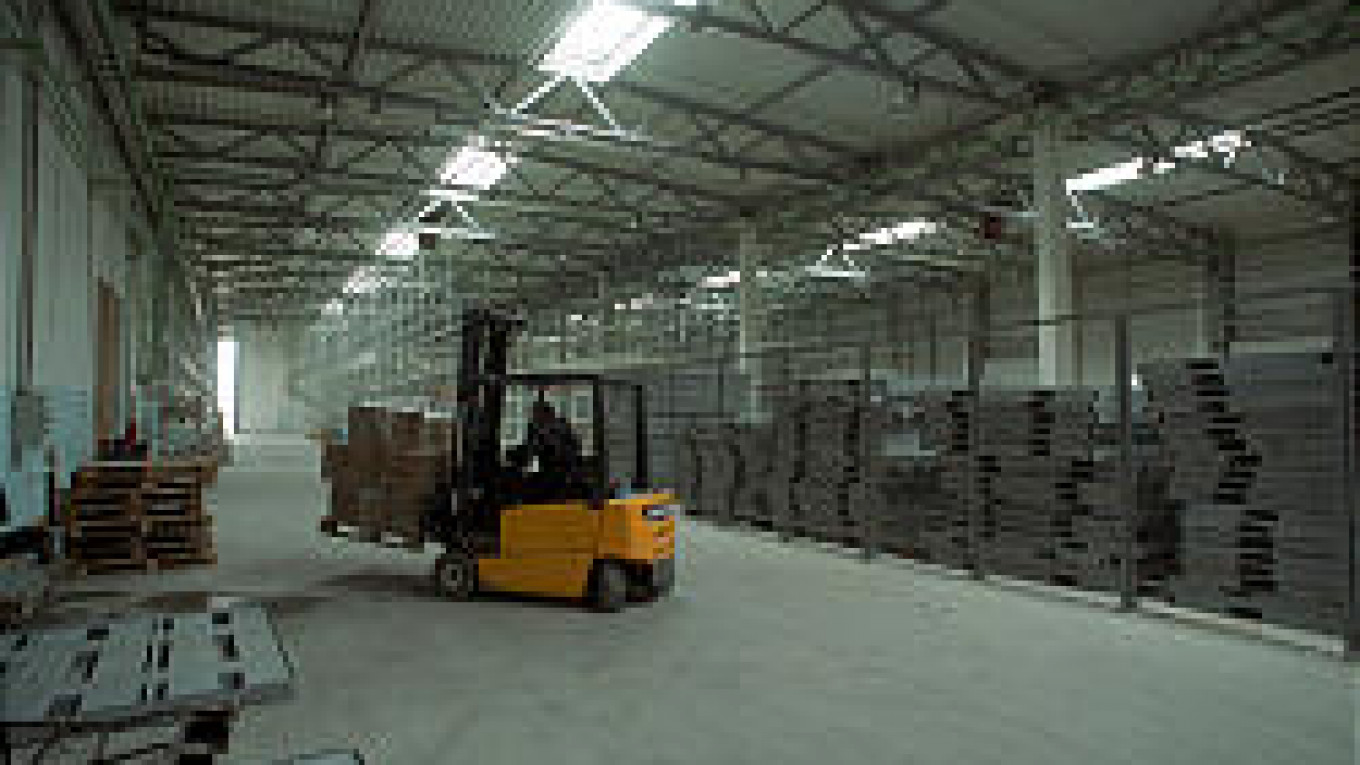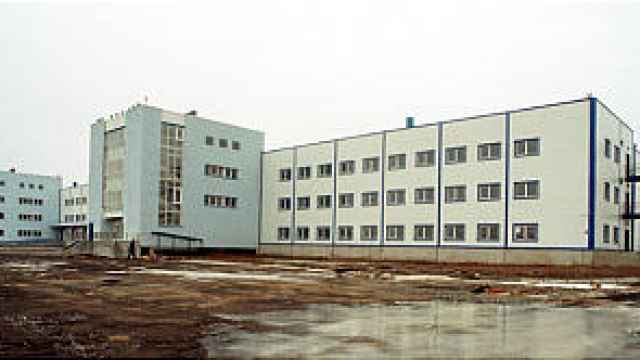The project to build the Pulkovo Cargo Terminal was initiated by Pulkovo Airlines and Germany's Lufthansa in 1998, with $8 million of the $12 million construction cost covered by a loan from the European Bank for Reconstruction and Development; the remainder was covered by Pulkovo and Lufthansa.
The terminal, located 17 kilometers from central St. Petersburg in the area between the Pulkovo-1 and Pulkovo-2 airports and the Pulkovskoye Shosse joining Moscow and St. Petersburg, is intended to be the major air cargo gateway in the nation's Northwest.
With an area of 8,000 square meters and the capacity to handle 30,000 tons of cargo per year, the new terminal had been billed as a major step forward from the existing facilities -- although it is small compared with the country's largest air cargo terminal at Moscow's Domodedovo Airport, which has 12,720 square meters and the capacity to handle 240,000 tons of cargo per year. Last year Domodedovo handled 185,000 tons of cargo.
One air-cargo industry official said St. Petersburg's old facilities, within Pulkovo-1 and Pulkovo-2 themselves, are not heated and are not equipped to deal with frozen, dangerous or live cargo. But the source said a big jump in the prices led the airlines to question whether the new facility is worth it.
"I have serious concerns in relation to the prices offered by the new terminal," the source said in an interview earlier this month. "The terminal is using its monopoly position to try to charge rates two or three times higher than before."
As a result, most companies involved have been refusing to sign contracts to work out of the new facility.
The company operating the new facility, Pulkovo Cargo Terminal, is a Russian-German joint venture 40 percent owned by Pulkovo Airlines, with another 40 percent owned by Lufthansa subsidiary Globe Ground and the remaining 20 percent in the hands of local construction firm Lenstroizhilservis.
The story behind the standoff began in the middle of December, when Pulkovo Airlines sent all cargo-transport departments of airlines working out of St. Petersburg a letter signed by Nikolai Kolesov, the deputy general director of Pulkovo Airlines and the chairman of the administration board of the new cargo terminal. The letter informed them that as of Feb. 15, all cargo-handling work at the old warehouses would be transferred to the new facility.
But a letter signed Jan. 22 by the cargo representatives of 11 foreign airlines -- including British Airways, KLM, Lufthansa, Finnair, Air France and Austrian Airlines -- informed the management of the new terminal that the airlines were not prepared to sign on.
The companies listed a number of grievances with the new site, including a lack of clarity as to how the system at the new location would function and the level of fees to be charged for using it.
The companies wrote that if some kind of compromise could not be reached between the two sides, they would seek other methods of shipping cargo out of St. Petersburg.
The same letter was also sent to Pulkovo Cargo Terminal general director Kristian Altmann.
A reply came from Boris Demchenko, Pulkovo Airlines' general director, at the end of January. He wrote that new contracts and tariffs for using the cargo terminal would be discussed with carriers on an individual basis.
|
Alexander Belenky / MT Airlines have been refusing to shift their operations to the new facility, claiming that the management's charges are too high. |
Then, in a letter dated Feb. 5, Pulkovo Cargo Terminal officials provided information explaining how the system at the new facility was to work, while also extending the deadline for moving to the new terminal to April 14.
Despite a request in the letter for airline representatives to sign agreements with Pulkovo Cargo Terminal quickly, they have not been in a rush to do so.
"If the terms offered by the new terminal aren't satisfactory for the headquarters of the airlines, they will probably just decide to close their cargo operations in St. Petersburg and ship by an alternate route, through Moscow or Helsinki," said Natalya Fedorova, the CIS general director of freight expedition firm Cargo Service Center. "But I'm hopeful that we will reach an agreement, as the management at Pulkovo Cargo Terminal has started to show a willingness to move toward our position."
Dmitry Ivanov, cargo-sales representative for Dutch airline KLM in St. Petersburg, agreed that progress had been made, and said KLM and other carriers were coming close to signing agreements with the new terminal. At least one airline is believed to have already signed on, but this could not be confirmed.
Frank-Uwe Ungerer, the acting general director of Pulkovo Cargo Terminal, confirmed that the new prices were higher than those charged by the old Pulkovo warehouses, but refused to discuss exact figures, saying that they would be agreed on a company-by-company basis. He defended the hikes, however, saying that the new prices reflected the new facility and higher levels of service.
"It's not realistic to simply compare the prices at the old and new terminals," Ungerer said. "The new terminal offers the transport companies new working conditions and the complete range of services needed by air-cargo firms."
But prices are not the only worry for airlines. While Pulkovo Cargo Terminal officials are trumpeting the broader set of services, some worry that this will drive other firms from the market.
"The new terminal wants to become a monopoly in the fields of organization, sales and customs brokerage for cargo shipping," said one source, who asked not to be identified. "Using its monopoly position, the terminal will be able to push out other firms that are working in customs brokerage and expediting."
About 70 percent of international import and export cargo going through Pulkovo is carried by top foreign airlines Lufthansa, British Airways, KLM, Finnair and Air France.
The volume of cargo moved through Pulkovo-1 and Pulkovo-2 totaled about 3,860 tons in 2000 and 3,930 tons in 2001. Officials at Pulkovo Cargo Terminal say they expect the growth rate of air-cargo tonnage to continue to increase at about 10 percent per year.
A Message from The Moscow Times:
Dear readers,
We are facing unprecedented challenges. Russia's Prosecutor General's Office has designated The Moscow Times as an "undesirable" organization, criminalizing our work and putting our staff at risk of prosecution. This follows our earlier unjust labeling as a "foreign agent."
These actions are direct attempts to silence independent journalism in Russia. The authorities claim our work "discredits the decisions of the Russian leadership." We see things differently: we strive to provide accurate, unbiased reporting on Russia.
We, the journalists of The Moscow Times, refuse to be silenced. But to continue our work, we need your help.
Your support, no matter how small, makes a world of difference. If you can, please support us monthly starting from just $2. It's quick to set up, and every contribution makes a significant impact.
By supporting The Moscow Times, you're defending open, independent journalism in the face of repression. Thank you for standing with us.
Remind me later.



